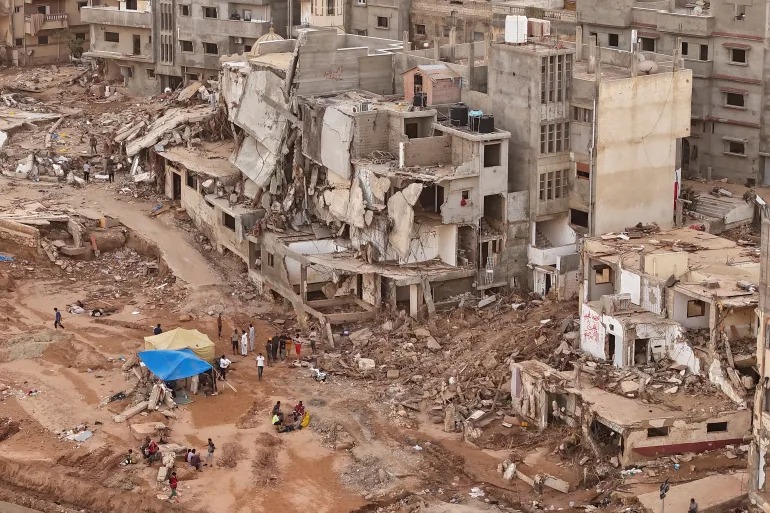In the wake of a catastrophic flood disaster that claimed the lives of thousands and left a city in ruins, Libya’s chief prosecutor has taken decisive action by ordering the arrest of eight current and former officials. This significant development comes as the nation grapples with the aftermath of the devastating collapse of two dams near the city of Derna, which unleashed a deluge of water, causing widespread destruction and loss of life. The top prosecutor, General Prosecutor Al-Siddiq Al-Sour, has initiated a rigorous investigation into allegations of mismanagement, negligence, and mistakes that contributed to this heart-wrenching tragedy.
Officials Detained in Connection with Deadly Dam Failures
The catastrophe unfolded on September 11 when two dams located outside the city of Derna crumbled under the relentless onslaught of Storm Daniel, which brought heavy rains to eastern Libya. The failure of these structures unleashed a wall of water several meters high, inundating nearly a quarter of the city, obliterating entire neighborhoods, and tragically sweeping numerous residents out to sea. The latest official toll reports that more than 3,800 people lost their lives in this calamity, while international aid groups fear that over 10,000 individuals may still be missing.
In a press statement released by General Prosecutor Al-Siddiq Al-Sour’s office, it was revealed that seven former and current officials from the Water Resources Authority and the Dams Management Authority, along with Derna Mayor Abdulmenam al-Ghaithi, were questioned regarding their roles in the disaster. Shockingly, none of the eight individuals provided evidence to exonerate themselves from potential charges, compelling prosecutors to order their immediate detention pending the completion of the investigation.
Investigation Uncovers Negligence and Mismanagement in Dam Maintenance
The chief prosecutor has pointed to a troubling revelation concerning the condition of the dams upstream from Derna. The dams had reportedly been compromised since 1998, and although repair work had commenced in 2010 under the supervision of a Turkish company, it was abruptly halted after a few months due to the eruption of Libya’s 2011 uprising. Regrettably, these vital repairs were never resumed, leaving the dams in a state of disrepair and raising questions about the contract between the Turkish firm and Libya’s water department.
General Prosecutor Al-Sour has pledged to hold those responsible for this egregious failure to account. His focus remains firmly on the dam maintenance contract, which could serve as a critical piece of evidence in the investigation. However, the intricacies of the inquiry are compounded by Libya’s prolonged political division, as mounting calls for an international investigation reflect the deep-seated mistrust in the country’s institutions.
Political Turmoil Hampers Recovery Efforts in the Aftermath of the Disaster
Libya, once a thriving oil-rich North African nation, has been mired in chaos since 2011 when a NATO-backed uprising toppled the regime of Muammar Gaddafi, culminating in his death. In the ensuing years, the country has been plagued by competing administrations, with rival factions vying for control, further exacerbating the nation’s instability.
Two weeks after the devastating dam failures in Derna, the recovery efforts remain arduous. Local and international teams continue to sift through the wreckage, searching for victims amidst the mud and the debris. Additionally, they have expanded their search efforts to the Mediterranean Sea, scouring the waters for the bodies of those who were swept away in the torrential flood.
The United Nations Office for the Coordination of Humanitarian Affairs (OCHA) reports that as much as one-third of Derna’s housing and infrastructure have been severely damaged, prompting authorities to evacuate the most affected areas. However, the city’s recovery is hampered by the ongoing political turmoil, which hinders the coordination of relief efforts.
The impact of this flood disaster reverberates far beyond the city of Derna, affecting other eastern Libyan towns such as Bayda, Susa, Marj, and Shahat. Tens of thousands of residents in these areas have been displaced, seeking shelter in schools and government buildings as they strive to rebuild their lives in the face of adversity.















